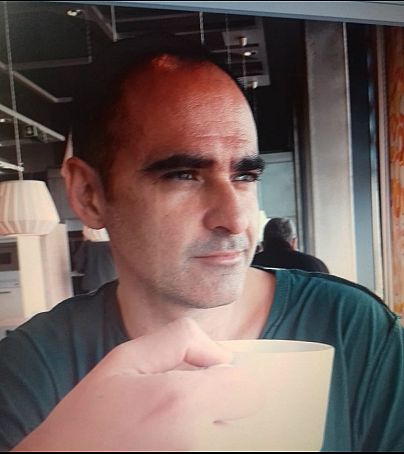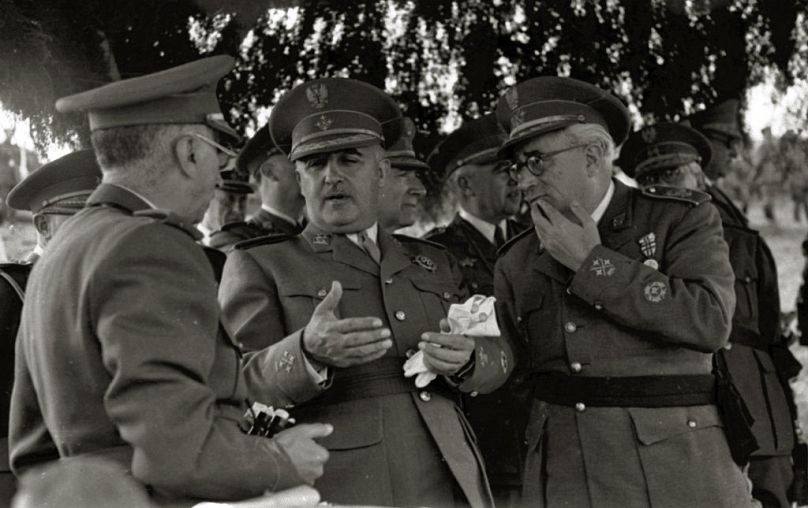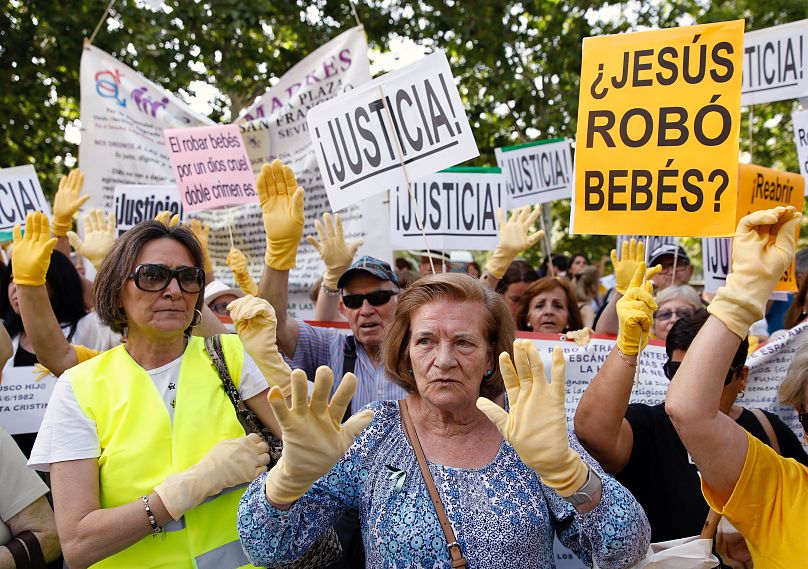Euronews spoke to Jose Maria Garcia Gonzalez, 41, one of Spain's 'stolen babies'.
An 85-year-old gynaecologist stood trial on Tuesday for abducting a newborn baby and giving it to another woman in 1969. The gynaecologist in question, Dr Eduardo Vela, was the man behind the suspected baby-stealing programme started under the Franco regime and ran until the mid-1980s.
Euronews spoke with Jose Maria Garcia Gonzalez, 41, who found out he was adopted six years ago.
Garcia Gonzalez was born September 2, 1977, in Madrid's San Ramon clinic where Vela was director at the time.
How did you find out you were one of the stolen babies?
"I grew up all my life thinking I was the biological child of my parents and when I was 35 I was gathering up my papers to get married and discovered that my birth certificate said I was adopted. It also said that I was adopted from the San Ramon clinic, which was already known as the clinic involved in the stolen babies scandal.
"And when I read the name of Eduardo Vela, I knew I was one of the stolen babies. I immediately got in contact with all the NGOs working with stolen babies and they guided me through all the legal documents I could ask from the government so I could look into the identity of my birth parents."
"The problem is that since this was all plotted to perfection, that information was erased. It didn’t appear anywhere — not even the documents that should’ve been filled out.
So you see that’s how I found out."
Garcia Gonzalez's parents told him how they were involved in the scheme after talking to friends from church.
Garcia Gonzalez and activists say the Catholic church played a big role in running the programmes. Nuns and priests, they say, would work alongside hospital staff to take babies from young, poor expecting mothers or left-wing couples.
“Many of the young women were coaxed by nuns to give their babies away. The majority were shown a dead baby that wasn’t theirs to convince them their newborn had died — that way they stole the babies,” said Garcia Gonzalez.
“In the majority of cases, mothers were completely manipulated and coaxed by hospital and church staff.”
“My parents got in contact with a priest who told them he could get them a baby.”
And after a while, they got a phone call from Dr Vela.
“‘I have a baby boy,’ he said to my parents, ‘if you don’t want him I’ll send him to Bilbao.’”
His parents accepted and that’s how he was "adopted".
Franco came to power in 1939, after defeating the Republican left-wing party in the Spanish civil war. During his regime, Franco tried to purge Spain from Marxist influence, which explains how the practice of taking babies away from left-wing families was born. Many of these newborns were given to couples who were part of the regime, while other babies were given to supporters of Franco's ideology.
In the 1950s, the system was extended to poor families or couples seen as "unfit" to raise a child, as it was at odds with the Catholic and nationalist ideology of the regime.
Ten years later, the business side of the programme gained momentum after those working the system realised how lucrative the scheme had become.
What was your reaction to the news that you were a 'stolen baby'?
"Well I spent two days without sleeping and I didn’t know what to do. I didn’t know whether to tell my parents. I was just speechless and in a state of shock for awhile. I almost had a severe car accident because I lost consciousness for a few minutes of the pain I was feeling. Thankfully, I was able to come out of the shock but I almost died in that car accident," said Garcia Gonzalez.
After not sleeping for two nights, the 41-year-old decided to tell his parents that he knew the truth, which was "very hard, obviously."
"To this day the relationship I have with my parents is very good because they’ve been good adoptive parents. But they did make a huge mistake by not telling me."
Garcia Gonzalez's parents did not to tell him the truth over fear of being rejected and hated, he said.
“The Spain of 1977 was still living under Franco’s shadow despite the dictator’s death in 1975. So in that Spain, 40 years ago, there was still a strongly patriarchal culture, in which a woman could only vindicate herself by being a mother and a for a man, the dream was to have a good job, lots of children, and be rich,” he said.
“People that didn’t fall into that category were stigmatised as weak and inferior. So that’s why the (baby stealing) scheme was hidden.”
How did your parents react when you told them that you knew you were ‘adopted’?
"They started crying and started asking for forgiveness — but there are some things where an apology is not enough."
"They had a lot of time to tell me the truth about my biological origins and they never did it."
How do you feel living with the fact that you were stolen from your biological parents?
"It’s very complicated. Fortunately, I was 35 years old when I found out and had a family of my own, so I wasn’t living with my parents anymore."
"But obviously I wanted to know my biological origins, not only for practical reasons — if I could have genetic diseases — but for psychological stability, a person needs to know where they come from."
"Those that don’t know their origins suffer a lot and it paves a road of suffering that I try to deal with in the best way possible."
Garcia Gonzalez has no idea who his biological parents are. He's done DNA tests in various places — two labs in Spain and one lab in the US — but it was impossible to track down his parents.
Are you pursuing legal action against Vela?
"Yes, I hired a good lawyer to help me build my case but since my birth certificate says I was adopted, but doesn’t include any information pertaining to my biological family, there isn’t enough proof to denounce Dr Vela."
"My biological mother would have to give a statement saying that she was duped into giving me up."
What do you think of Vela's trial?
"I’m happy because it’s a moral victory. People think ['stolen babies'] are crazy, that we only want money but what we really want are three things: truth, justice, and repair."
"We want to know who are parents are, we want to have justice and have the people responsible for the programme sent to jail, and we want repair for the damage caused."
However, Garcia Gonzalez doesn't believe justice will be served.
"I know nothing will be done because these people are very protected and they belong to rich, powerful lobbies. They control the justice system and we won’t be able to do anything.
"I hope to be wrong but I don’t think justice will be served."














